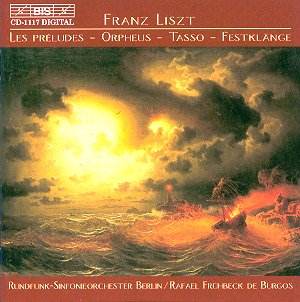Franz LISZT (1811-1886)
Les Préludes
Orpheus
Tasso
Festklänge
 Berlin Radio Symphony
Orchestra/Rafael Frühbeck de Burgos
Berlin Radio Symphony
Orchestra/Rafael Frühbeck de Burgos
Rec November 1999, Nalepastraße, Berlin
 BIS CD1117
[66.23]
BIS CD1117
[66.23]
Crotchet
AmazonUK
AmazonUS
Amazon
recommendations

During the 1850s, when he worked as kapellmeister at Weimar, Liszt composed
a series of twelve symphonic poems (a thirteenth followed later), and in
doing so he invented the term itself. Les Préludes,
the third of these works, was begun in 1848 and then revised a few years
later, the final version dating from 1853. It soon became what it has remained
ever since: one of his best-loved compositions.
It is not hard to understand why. The music relies on his favoured principle
of development, the 'metamorphosis of themes', and the close organic unity
is allied to distinctive melodic invention, to create a vivid orchestral
environment. All these strengths are readily apparent in Frühbeck de
Burgos's performance with the excellent Berlin Radio Symphony Orchestra,
in a typically truthful and ambient BIS recording.
The other work in this collection which combines both variety and unity at
the highest level of inspiration is less celebrated but equally successful
artistically: Tasso, Lament and Triumph. Perhaps this is harder
to bring off because of its more extended scale, but bring it off these
performers certainly do. The final apotheosis, the triumph that follows the
lament, is particularly compelling, with blazing brass and a cogent sense
of musical fulfilment.
Festklänge is altogether less well known, and it is also
altogether less successful in reconciling the imagery behind the concept
- the 'festive sounds' - with a tight and imaginative development of the
material. The latter is, if anything, somewhat banal, and the piece is
repetitive, not really sustaining its twenty minute duration. The performance
fails to catch fire, nor is it sonically spectacular enough to make a real
impact. Frühbeck de Burgos, so convincing elsewhere, is less so here,
but nor does Haitink with the LPO (on Philips) fare any better. Perhaps the
problem lies more with the music than with the performance, though it might
lie with the reviewer, of course.
The best of these four performances is that of the shortest item, the ten-minute
long Orpheus. This is a particularly lyrical composition, nicely
shaped and well played, with some beautiful contributions from the wind
principals in particular. The recorded sound captures the restrained atmosphere
with much sensitivity.
Terry Barfoot

